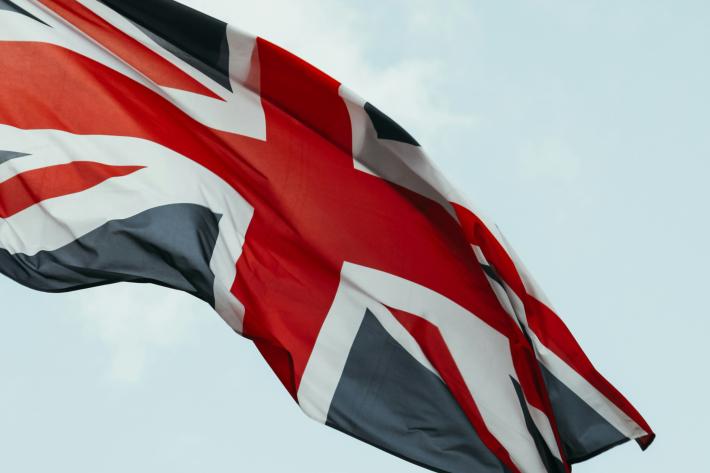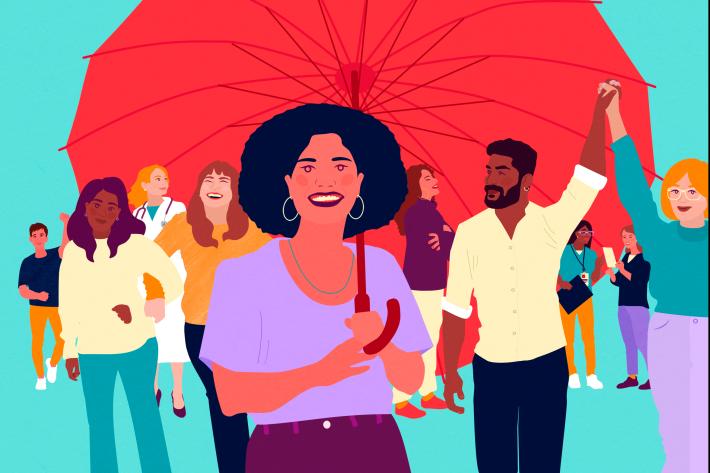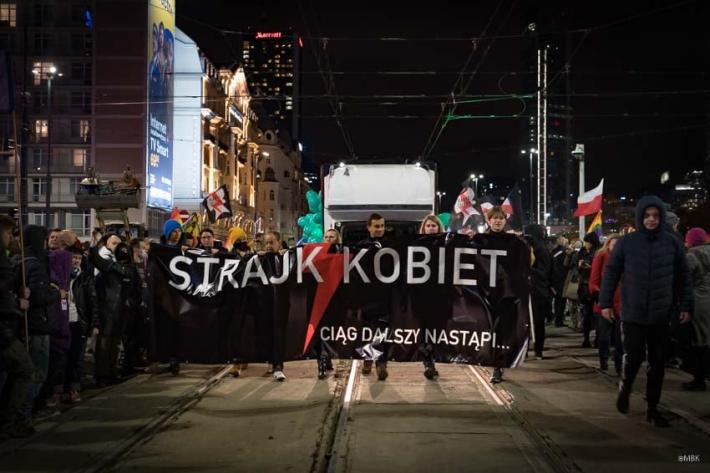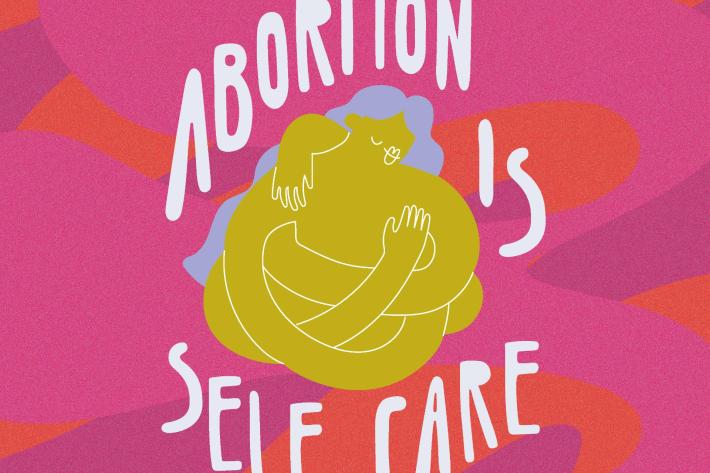
Spotlight
A selection of news from across the Federation

European Commission's new Women's Rights Roadmap includes SRHR—Now we need action
On 7 March, the EC released a new political declaration committing to uphold and advance women's rights. We welcome the inclusion of SRHR and other key topics. Now impactful actions are needed.
Filter our news by:


| 18 May 2020
IPPF is committed to fighting homophobia and transphobia worldwide
Today marks the International Day Against Homophobia, Transphobia and Biphobia (IDAHOBIT), a day to draw attention to the discrimination and violence experienced by the LGBTI community. The day represents a major global annual landmark to draw the attention of decision makers, the media, the public, corporations, opinion leaders and local authorities to the alarming situation faced by people with diverse sexual orientations, gender identities or expressions, and sex characteristics. Sexual and reproductive health and rights are for everyone, inclusive of sexual and gender diversity. This is particularly important since the outbreak of COVID-19, where people not conforming to sexual and gender norms are facing further abuse, neglect, incarceration and stigmatization. IPPF’s vision for "a world where all people can make decisions about their sexuality and well-being, in a world free of discrimination" strongly supports the position that all people have the right to self-determination according to their sexual orientation, gender identity or expression, and sex characteristics. IPPF is made up of people who also reflect sexual and gender diversity – many of our staff, board members, volunteers and partners are part of LGBTI communities. Our Federation is committed to providing quality and non-discriminatory services to lesbian, gay, bisexual, trans and intersex (LGBTI) people, and to fight for the recognition of the rights of sexual and gender diverse people worldwide. “The trans community has been implementing projects for sexual health promotion with MEXFAM for many years. We work with our peers from the LGBTI community, but also with the general population and they really appreciate what we do. They come to us for counseling and information. We are not the ‘weirdos’ anymore." – Joseline Sosa, volunteer at MEXFAM Oaxaca, an IPPF Member Association We work in cooperation and solidarity with the LGBTI movement by: Promoting inter-governmental declarations that recognize the right to a life free of violence and discrimination for LGBTI people at the UN in Geneva and New York Fighting for the decriminalization of same-sex acts where it is still prohibited, including Trinidad & Tobago and India Provide friendly services for HIV and STI prevention and treatment for men who have sex with men in Botswana Partnering with LGBTI organizations to respond to humanitarian situations in Nepal and Tonga Supporting teachers in providing sexual and gender diverse education all over the world Implementing protocols for sex change for trans people in Colombia Providing trans-specific dignity kits during natural disasters in Sri Lanka Fighting for same-sex marriage and recognition of same-sex families in Romania Those are just a few examples, but members of our Federation have been supporting the movement for years, and in some cases for decades. Since 2018, IPPF has established a Steering Committee, led by our Member Association in Norway, Sex og Politikk, to advance the sexual and gender diversity agenda within and outside our Federation.The Steering Committee includes representatives from all the Regional Offices. On 17 May, the International Day Against Homophobia, Transphobia and Biphobia, we reaffirm our commitment to achieving a world in which no person suffers discrimination or violence because of their sexual orientation, gender identity and expression, or sex characteristics; a world where the life or the integrity of people is not put at risk by prejudice; a world where all people can decide with whom to share their sexuality and their life; a world where people live healthy lives regardless of their sexual practices and their bodies. IPPF – in all of its diversity – will continue to fight for the human right for all people, regardless of their sexual orientation, gender identity or expression, and sex characteristics, to be respected, celebrated and recognized. In the end – love wins. Happy IDAHOBIT!

| 22 April 2020
For a Europe that cares for all – during the COVID-19 pandemic and beyond
Democracy – Inclusion – Justice – Solidarity – Sustainability The COVID-19 pandemic is demonstrating all too well that unequal societies go hand-in-hand with human suffering, fragile economies and delicate democracies. Solidarity must be the bedrock of Europe’s response to this crisis: to fighting the pandemic and protecting all people, to managing the social and economic consequences, and to defending democracy. Solidarity goes beyond borders and should not be limited to European Union countries. This is more than a public health crisis; it is a systems crisis. Like the climate crisis, and the many other crises we face, it affects everyone but hits some harder than others. The COVID-19 pandemic magnifies the inequalities in our societies. Inequality was already a global problem but it now risks growing to irreversible proportions. Alongside the millions of workers who have lost their jobs and income, those most affected include migrants at the borders, precarious workers, undocumented people, low income families, homeless people, elderly people, women, and people with disabilities or chronic illnesses – including many racial and ethnic minorities. Health workers, and other essential service workers, are on the front line. We are witnessing the fundamental social and economic value of care work and basic services, work that is overwhelmingly carried out by women, and is too often ignored, under-valued, and always under-paid. We, the undersigned European civil society actors, are committed to working together towards a shared vision of the future of Europe, one that is based on a socially just, feminist, sustainable, democratic and inclusive society. In this time of crisis, we stand ready, in solidarity, to act together. We recognise that alongside international organizations, NGOs and governments, the European Union has attempted to respond to this emergency. However, it can and must go further. We call on the European institutions and Member State governments to seize this moment to work towards fundamental change in our social, economic and political systems. We stand ready to support the transition away from the current social and economic model, which drives inequality and environmental destruction and leaves us unprepared when crises hit. We call on European decision-makers to come together, across borders, to show the vision and courage to set Europe on the path to a sustainable future; a future of resilient democracies built on human dignity, freedom, democracy, equality, human rights and the rule of law. Europe must demonstrate it cares for all, through times of crisis, and beyond The European Union must take action to: Build a solidarity-driven and comprehensive strategy to prevent infections, save lives and minimise the ongoing impact of the pandemic. This must include ensuring that any vaccine, or treatment, developed for COVID-19 is affordable and accessible to all, and that patent rules that put pharmaceutical industry profits before public health are overhauled. Raise awareness of, and help to counter, all forms of disinformation, in particular racist and sexist responses to the pandemic. Ensure that restrictive emergency measures serve the purpose of combating the pandemic only, are time-limited, and are compatible with the rule of law and the EU’s fundamental values. Simultaneously, dialogue with, and support for, organised civil society must be maintained. Guarantee that any use of digital technologies, including apps and Artificial Intelligence, to monitor the spread of the virus and the behaviour of human beings is lawful, ethical, and strictly temporary. Private companies must not be allowed to access this data for commercial purposes. End the age of austerity in Europe, and work towards a macroeconomic framework that prioritises tackling inequality, and invests in human wellbeing and the preservation and protection of the natural environment that sustains us. Tax wealthy companies and individuals to help pay for the costs of the rescue and recovery packages. Strengthen workers' rights, safeguard employment, support people’s income, and introduce measures to protect those left out of the labour market. Measures should address the situation in Europe and the EU’s partner countries, and should especially consider health workers, care-givers and those in precarious work, the overwhelming majority of whom are women. Support health systems and people in the global South, and ensure basic services, in particular healthcare and access to water, are provided to all regardless of resident status, race, nationality, language or other factors. Fast-forward the transition to a just, sustainable future by increasing the ambition of the European Green Deal. This requires transformational solutions and investing in the Just Transition, including quality low-energy buildings and public transport, low resource-use models of production, and a robust and sustainable food system. Develop a more resilient, structured and permanent governance system at the EU-27 level for the management of health crises, which draws lessons from the current COVID-19 crisis. Signatories 350.org ACT Alliance EU ActionAid International Albanian Center for Population and Development (ACPD) All Together in Dignity (ATD) Ireland Amnesty International Asociación Caminos ATD Fourth World CATRO Bulgaria CEE Bankwatch Network CIDSE Climate Action Network (CAN) Europe CONCORD Europe Coordinadora de ONGD-España Czechia Against Poverty and Inequality Defend Democracy End FGM European Network Eurodiaconia European Civic Forum European Consortium for Emergency Contraception European Disability Forum European Environmental Bureau (EEB) European Movement International European Network Against Racism (ENAR) European Oncology Nursing Society European Trade Union Confederation (ETUC) European Women’s Lobby European Youth Forum Fair Trade Advocacy Office Federación de Planificación Familiar de España Friends of the Earth Europe Global Call to Action Against Poverty (GCAP) Greenpeace Health and Environment Alliance (HEAL) International Partnership for Human Rights (IPHR) International Planned Parenthood Federation, European Network Know and Can Association Le Planning Familial Lithuanian NGDO Platform Mighty Earth Naturefriends International (NFI) Open Society European Policy Initiative Österreichische Gesellschaft für Familienplanung (ÖGF) P&D Factor - Ass. Cooperação sobre População e Desencolvimento, Portugal Pistes Solidaires Povod Rehabilitation Center for Stress and Trauma - RCT SOCIAL PLATFORM Society for Education on Contraception and Sexuality (SECS) Romania SOLIDAR The Good Lobby WeMove Europe WWF European Policy Office (EPO) YouAct - European Youth Network on Sexual and Reproductive Rights Young Feminist Europe Young Friends of the Earth Europe

| 10 April 2020
Polish ruling party exploits the current health crisis to undermine women and young people’s safety
Amid the Covid-19 pandemic, bills banning abortion care in practice and endangering young people by criminalizing relationship and sexuality education are set to be voted in the Polish Sejm on 15 and 16 April 2020. The ultra-conservative ruling party is taking advantage of the enormous hardship faced by Polish people to continue its relentless series of attacks on women and young people’s safety and wellbeing. People are sick, domestic violence is growing, one million jobs have been lost, yet the government adds to the burden of lack of social supports. The Polish law on abortion care is one of the most restrictive in Europe. Abortion is only lawful to safeguard the life or health of women, in situations of severe fetal anomaly or where the pregnancy results from rape or incest. In practice, 98% of legal abortions in Poland are performed on severe fetal anomaly grounds. During COVID-19 times, with travel restriction in place, hospitals overwhelmed by the health emergency, many from the medical staff already denying care based on personal beliefs or convenience, women’s options are drastically reduced. This proposed bill would result in a total abortion ban in practice, forcing women and families to go through pregnancies against their will in case of fatal fetal abnormality at a time of dramatic economic instability with no social support from the state. This shows how little women’s lives and dignity are valued by the Polish ruling class. The bill would also gag doctors by restricting what they can say to their patients about the condition of the fetus, violating patients’ rights to information. The change proposed by this bill is permanent and will place women’s health and lives at risk. “We know that when women and girls cannot access abortion care, in their desperation, they will resort to taking matters into their own hands, often with tragic consequences. Domestic violence is rising sharply, and families are stretched to the limits of their endurance. It is the moment when we most need to ensure we provide all the care that our societies need” said Caroline Hickson, IPPF EN Regional Director. The second bill would result in a complete ban on teaching relationship and sexuality education, sharing evidence-based information on the Internet, as well as forbidding doctors from providing contraceptive care to young people under 18. Those who work to protect young people by giving them information about healthy relationships, intimate life and prevention of violence could face a 3-year prison sentence under this draft bill. The only source of information young people could end up with is pornography and religious doctrines. UNESCO guidelines underline that education addressing equality between men and women and focusing on consent can reduce intimate partner violence. Why is this not a priority when violence against women is endemic and we know is even aggravated during the lockdown? “The timing of these bills is dodgy. As public protests cannot take place due to the measures put in place to fight the pandemic, women are silenced. The medieval forces behind these proposals know massive protests would have been organized across the country to fight these draconian bills. Enough is enough” said Irene Donadio, IPPF EN Senior Adviser. We call on Members of Poland’s Parliament to listen to the voices of women and families across Poland, to protect women’s safety and young people’s health and to reject these regressive bills. The Polish government must prioritise people’s health and wellbeing, democracy and the rule of law. Exploiting the health crisis to attack women’s health care is reckless, cruel and a guarantee of aggravated human suffering. For more information or an interview please contact: Irene Donadio, Senior Adviser at IPPF EN, [email protected], +32 491 17 19 390

| 07 April 2020
COVID-19 pandemic cuts access to sexual and reproductive healthcare for women around the world
The COVID-19 pandemic is having a major impact on the delivery of sexual and reproductive healthcare around the world, according to a survey of its national members conducted by the International Planned Parenthood Federation (IPPF). 5,633 static and mobile clinics and community-based care outlets have already closed because of the outbreak, across 64 countries. They make-up 14 % of the total service delivery points IPPF Members ran in 2018. For static clinics – which provided 114 million services to clients in 2018 – the figure is even worse. More than one in five has already closed – 546 in total. The survey is the largest global set of data available so far on how organisations delivering sexual and reproductive healthcare have been hit by COVID-19. It found: IPPF’s South Asia region has seen the largest number of closures overall, with more than 1,872 clinics and other service outlets closed. The Africa region has seen the largest number of mobile clinics closed, with 447 shut. 971 mobile clinics and community-based care outlets in the Federation’s Western Hemisphere region have been shut down by the pandemic. IPPF’s Europe region has seen 208 static clinics close. The East and South East Asia and Oceania region has seen 334 mobile clinics close. IPPF’s Arab World region has seen 56 static clinics close. Countries particularly affected by closures include Pakistan, El Salvador, Zambia, Sudan, Colombia, Malaysia, Uganda, Ghana, Germany, Zimbabwe and Sri Lanka. All have reported more than 100 closures of clinics and/or community-based service outlets. Dozens of IPPF’s members say they have been forced to cut sexual and reproductive healthcare services as a result of COVID-19 restrictions. 44 national members report scaling down HIV testing 41 national members say they have scaled down contraceptive care services 36 national members are scaling down services on gender-based violence 23 national members reported reduced availability of abortion care Many national members are also reporting struggles to get hold of key commodities and supplies. 59 say they are facing delays in moving goods within countries. 29 say they are facing a shortage of contraceptives. 16 have reported shortages of HIV-related medicines. IPPF Director General Dr Alvaro Bermejo said: “The COVID-19 pandemic is a health crisis across every setting, and that includes sexual and reproductive healthcare. These figures show that millions of women and girls across the world now face an even greater challenge in trying to take care of their own health and bodies. They have needs that cannot wait, but they are facing a lack of time, lack of choice and lack of access to essential sexual and reproductive health services. If these losses can’t be course corrected the consequences for women and girls will be catastrophic; resulting in loss of health, autonomy and life. Static clinics have been the biggest providers of sexual and reproductive healthcare across our Federation. The closure of hundreds of them is a devastating blow to the people we serve. And the loss of mobile clinics and community-based provision is particularly hard for poorer and underserved groups, who are often harder to reach and rely on services coming to them. Some of these closures will be due to government orders or social distancing needs. Ensuring access to critical sexual and reproductive healthcare like contraception, safe abortion and STI testing and treatment, including HIV and AIDS care is vital. We have to make sure that women and girls, who will experience the greatest care burden and increased levels of interpersonal violence, can get the care they need. Their rights and safety must be respected. Doing that whilst ensuring the safety of our providers is a priority. Without access to personal protective equipment (PPE) and a secure supply of vital commodities like contraceptives, members will not be able to reopen lost service points, and more will close. The longer they stay closed the greater the cost to the lives of women and girls.” IPPF has established an emergency fund to provide PPE to members in need and is coordinating a Federation-wide response through a COVID-19 Taskforce. Dr Bermejo said: “We will do everything we can within our Federation to maintain and restart services. But we also need to see action from national governments. Where technology exists and can be used, our members are working on providing virtual services that minimise physical contact. But without political will, and additional resources such as PPE, face to face services cannot be delivered safely during this pandemic. We need governments to make pragmatic and sensible changes to policies and legal frameworks making it easier for women to access care and obtain medication virtually. Access to telemedicine and the ability to take medicines in their own homes, such as medical abortion medication, already have a strong evidence base and should become standard. This will help deliver the care women and girls need urgently and lift some pressure from over-stretched public health services.”

| 07 April 2020
Failures to guarantee safe access to abortion endangers health of women, girls amid COVID-19
Joint press release with Amnesty International, Centre for Reproductive Rights, Human Rights Watch and International Planned Parenthood Federation. 100 groups call for urgent measures to safeguard access to abortion. European governments should urgently guarantee safe and timely access to abortion care for women and girls in the region during the COVID-19 pandemic, 100 nongovernmental organizations said today. Many women and girls in Europe are struggling to safely access abortion care during the pandemic as barriers caused by highly restrictive abortion laws and onerous administrative requirements to access abortion services make safe access to this essential health care extremely difficult. The call comes as Poland’s parliament prepares to debate a draconian new law that would make one of the region’s most highly restrictive abortion laws significantly more stringent. “European governments must act urgently to guarantee safe and timely access to abortion care during the COVID-19 pandemic,” said Leah Hoctor, Regional Director for Europe, Center for Reproductive Rights. “They should move swiftly to eradicate all medically unnecessary requirements that hamper access to abortion care and should authorize women to access early medical abortion from their homes.” Governments should recognize abortion as essential health care and should take measures to ensure that women and girls can safely access abortion care. Most governments in the region have not implemented measures to ensure safe and timely access to essential sexual and reproductive health services, supplies or information during the pandemic, including for at-home management of medical abortion. Many hospitals and clinics have reduced reproductive health services to a bare minimum, or closed altogether due to staff shortages and reassignments, among other reasons. In many places, accessing normal clinical services has become extremely difficult. Restrictions to reproductive health services disproportionately affect women living in poverty, women with disabilities, Roma women, undocumented migrant women, adolescents, trans and gender non-binary people, and women at risk of or who are survivors of domestic and sexual violence. Particular concerns arise in relation to those six European countries where abortion is still illegal or severely restricted and in countries where, due to a range of barriers such as administrative processes or doctor’s refusals of care due to their private beliefs, women are often forced to travel abroad to access abortion care or to obtain abortion medication from other countries by post. The harmful impact of these highly restrictive laws and barriers are compounded in the current context as it may now be impossible for women to travel to access legal abortion abroad or to obtain medication sent by post from medical providers in other countries. “Whilst the pandemic is impacting every aspect of our lives, it should not be used as an excuse to undermine women’s rights to make decisions regarding their reproductive and health rights,” said Caroline Hickson, IPPF EN Regional Director. Read full civil society statement here. For more information or to arrange an interview contact: Caroline Hickson, IPPF EN Regional Director, [email protected], +32 491 908767

| 15 November 2019
European Parliament condemns Polish bill that would criminalise relationship and sexuality education
As the International Planned Parenthood Federation European Network (IPPF EN), working to defend sexual and reproductive health and rights including relationship and sexuality education, we strongly welcome the European Parliament's (EP) resolution on the Criminalisation of sexual education in Poland - voted through by 471 MEPs. The resolution condemns the Polish draft law, that would criminalise the provision of information on sexuality to minors, including on contraception, the prevention of teenage pregnancies, the prevention of STDs including HIV/AIDS, information on sexual orientation and gender identity, and equality, respect and consent in relationships. The EP resolution reaffirms that relationship and sexuality education is enshrined in human rights law. It highlights that sexuality education is essential to create a positive, respectful and safe approach to relationships and sexuality, free from coercion, discrimination and violence; and has a positive impact on gender equality, including transforming harmful gender norms and preventing gender-based violence. Alternatively, a lack of information risks the safety and well-being of young people. For more information, please find here IPPF EN’s statement on the draft law.
Pagination
- First page
- Previous page
- …
- 11
- 12
- 13
- …
- Next page
- Last page
















